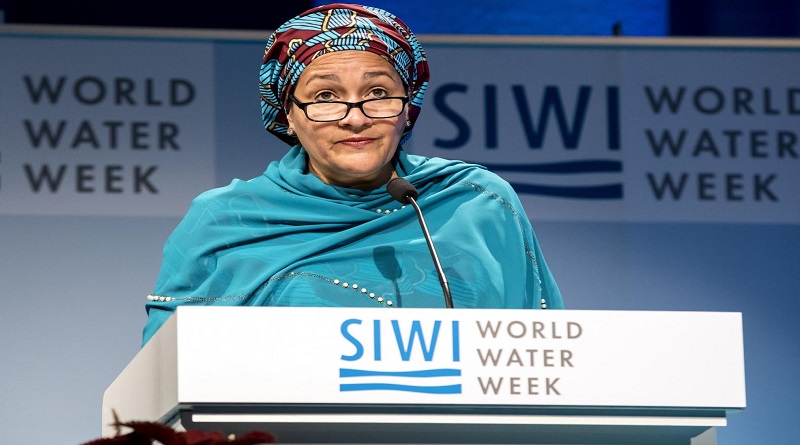World Water Week: Water is crucial to achieve SDGs, Paris Agreement, says Amina Mohammed
Photo Caption: UN Deputy Secretary-General Amina Mohammed at World Water Week in Stockholm.
United Nations Deputy Secretary-General, Amina Mohammed on Tuesday August 28, 2018 in reminded the audience at the ongoing World Water Week 2018 that water is crucial for achieving almost every Sustainable Development Goal (SDG) and that sustainable water management also plays a central role on the way to achieving the Paris Change Agreement.
“This is what the Sustainable Development Goals are about: Bringing this conceptual paradigm shift of doing things together and not in silos,” she said.
This week sees World Water Week, which this year has the theme “Water, Ecosystems and Human Development.
Following months of weather extremes around the globe including droughts, wildfires and crop shortfalls in Europe, a major World Water Week conference in Stockholm is taking place at a time of heightened awareness for the role of climate change within the nexus of water and development.
Water is fundamental for food security, human health, energy production, industrial productivity, and biodiversity.
Because of this, the main opening event was attended by UN Deputy Secretary-General Amina Mohammed, who highlighted the holistic approach of the event.
Countries have identified water as a key to building resilience to climate change in 93% of their national climate action plans under the Paris Agreement.
Climate Change is meanwhile putting pressure on fresh water resources in all regions of the world, thereby affecting people’s food security and health.
Dwindling fresh water resources also put a further question mark over the future of highly water-intensive forms of power production, notably through coal.
A recent study by the World Resources Institute and the International Renewable Energy Agency (IRENA) indicates the role that renewable energy can play in easing the water stress for affected countries.
Using the case of India, the authors show how improved power plant cooling technologies and less freshwater-intensive power generation like solar and wind can bring down water withdrawal in the energy sector up to 84% (excluding hydropower).
Change in Water Withdrawal study
Based on several different scenarios analyzed in the study, the authors conclude that “the growth in power sector emissions is projected to decrease across all scenarios analyzed, thereby helping India to meet its international and national climate commitments.”




